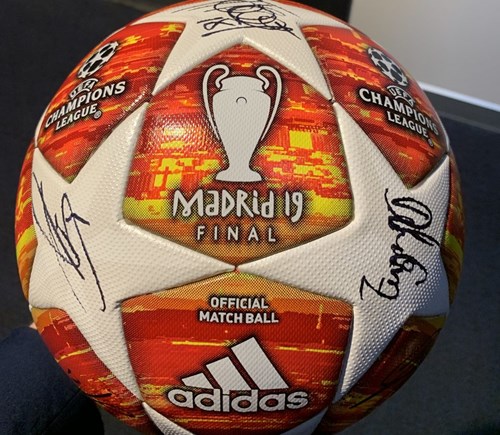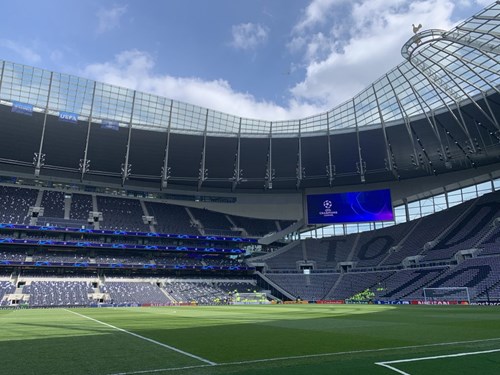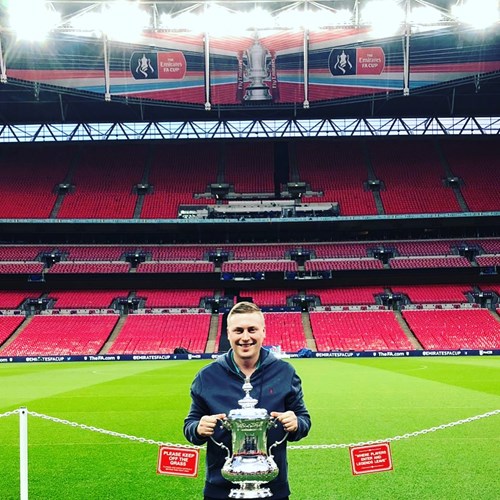The newly opened Tottenham Hotspur Stadium has already seen some classic events take place with the venue providing a fitting backdrop to the north-London clubs’ progression all the way to the Champions League final. The arena is setting new standards for fan engagement, commercial success, and matchday experience, among other things, and is already proving to be a gamechanger in the events industry. With the Champions League final between Tottenham and Liverpool fast approaching, we spoke with BA (Hons) Stadium & Events Management student Joe Rippington about his experiences working at the stadium for the semi-final, the highlights of working in events, and the rising popularity of the women’s game…
Hi Joe. Thanks for speaking with us. Tell us about your work on the Champions League semi-final with UEFA’s team. What was your role and how did the opportunity come about?
Hello, I was given the opportunity to work with UEFA’s Venue Management and Operational team for the Champions League quarter and semi-final fixtures at the new Tottenham Hotspur Stadium. The opportunity itself came through a contact that I had worked alongside previously throughout my time working for Delaware North at Wembley Stadium.

Joe worked on historic Champions League events at Spurs’ new stadium, witnessing the Premier League clubs’ progression to the final which takes place on 1st June in Madrid
During Tottenham Hotspur’s tenancy, UEFA operated over ten fixtures in the Champions League and Europa League and throughout those fixtures, I got to know some of the UEFA team quite well. With Tottenham’s first UEFA fixture at the new stadium falling shortly after opening against Manchester City I received an email from the venue manager asking if I would like to come down and assist on the matchday which for me was a fantastic opportunity. The role itself dealt with the distribution of accreditation for the broadcasters, assisting with branding and merchandising and assisting and interacting with guests in UEFA’s hospitality lounge.
What are the highlights when working on such a high-profile event like that? And how do you think it can benefit your employability and experience as you graduate and look to build your career?
Over the last three years I have been privileged enough to work on some of the biggest sporting events held at Wembley Stadium, including the boxing, multiple FA Cup Finals and the NFL to name a few, however I think anyone who has an interest in football understands how special the Champions League and European fixtures can be. It’s a fantastic feeling to have full access for a game of that stature and to be able to see the amount of work that goes into an event like that is incredible.
Joe has worked on some of the biggest sporting events held at Wembley Stadium in recent years, including elite boxing matches, multiple FA Cup Finals and the NFL
As someone who is aspiring to work within sport operations and events to gather an understanding of how UEFA operates is brilliant. In terms of benefiting employability, I believe strongly that the more experience and opportunities you can get it really does benefit your career. Subsequent to the semi-final I have been asked to go to Paris to work on the FIFA Congress in June so hopefully more opportunities will evolve from this!
As a BA (Hons) Stadium & Events Management student at UCFB, what’s your take on the new Tottenham Hotspur Stadium? Is it a game-changer for the UK events industry and what’s it like working there in that capacity? What features does the new stadium have that sets it apart?
The stadium itself is very impressive. An employee who was working there at the same time as me said that Daniel Levy wanted to be able to have the first of everything – and that does really come across. The venue is very open plan inside and does take you away from the fact that you are going there for the football! For a stadium of that capacity, something that really did impress me was how close to the pitch the supporters are. When you look at modern stadiums nowadays fans are often so far from the pitch it can be difficult to be able to generate a fantastic atmosphere but Tottenham’s new stadium very similarly to White Hart Lane has been able to implement this. There are many features that could be mentioned as with any new stadium there are things that I’ve never witnessed before but I think Tottenham Hotspur have done well to implement the ‘kop’, which is the one-tiered stand as opposed to the other three stands that hold many corporate hospitality seats this does not which from what I’ve heard the Tottenham fans have been delighted with.

Joe worked with UEFA’s Venue Management and Operational team for the Champions League quarter and semi-final fixtures at the new Tottenham Hotspur Stadium
The other main feature which was very impressive was on both sides of the stadium there are NFL changing rooms – which are huge! To be able to accommodate the NFL as well as Tottenham have done was another aspect of the stadium which I found very positive. A game changer for the UK events industry? I think so. Once inside the stadium, it’s very modern, but with a historic remembrance as to what was there before. It really doesn’t take long when inside the stadium to see reminders of White Hart Lane, but Tottenham have managed to bring in such things as the longest bar in Europe, the micro-brewery, so many food and beverage facilities and have gone completely cashless too, which I can see many venues following suit in the near future.
You’ve had really extensive experience in the events industry already with roles at Birmingham City and Delaware North/Wembley Stadium. Can you tell us about these other roles you’ve had and what you’ve learned about the industry?
I started off at Birmingham City as a 14-year-old completing work experience. I always felt that I wanted to work within football and sport but wasn’t 100% sure on what aspect. From completing work experience, I then started as a waiter a few months later on and ended up staying for five years! I was lucky enough to become supervisor and took over the players’ tunnel looking after the teams, home manager’s office and then began taking care of the Press Lounge too. This opportunity gave me a whole new view on what went on behind the scenes as I was no longer serving customers in the hospitality suites. From this, I knew I was coming to UCFB and tried to get myself the same job but at Wembley – it’s ever so slightly different! My job went from me looking after two rooms to a whole operation. During my time at Delaware North I have been very lucky to experience aspects of planning, meeting event owners and so many differently run organisations from The National League to the NFL it’s evident the differences in budgets and how vastly every event can differ. Although I am still working in hospitality, my job at Delaware North has enabled to me understand the operational side of an event a lot more and I have been able to meet many great people along the way.
The upcoming Women’s World Cup in France this summer is set to be the biggest event in the history of women’s football and follows the Women’s FA Cup final which had a crowd of 43,264 – one of the largest for a club-level women’s game in Europe in the modern era. How are these events reshaping the women’s game and how important are they in helping to achieve FA and UEFA targets on female participation?
This is now the third year, I believe, that the attendance record for the Women’s FA Cup Final has been broken and for over 43,000 spectators to turn up really does show how much the women’s game is developing and getting more coverage. For me, the coverage that women’s football is now receiving is helping hugely. With more coverage comes more finances – everyone knows how high the television rights are in the UK for the Premier League and within European fixtures for men’s football so for the women’s game to be receiving more coverage, it can only be a massive benefit.
When you look at The FA and UEFA, the promotion for women’s football is outstanding and it will continue to grow. There has been a huge increase of participation throughout women’s football over recent years and I think it’s really positive that The FA and UEFA are doing everything they can to ensure that the development and investment in women’s football continues to develop.
What advice would you have for students aspiring to work in the industry? What traits or experience should they be focusing on?
For any students looking to work within events, experience really is crucial. I would strongly encourage students to try and get as much experience as they can, whether it’s paid or voluntary. When the time comes for them to graduate and be looking for a full-time job, it may prove difficult to get to where they want to be without prior experience. London has so many great opportunities to work within events, and especially within sports, it’s just finding them. Always be on the lookout because opportunities do come up! The events industry often operates long hours so students need to be ready to work hard for long periods of time and try to remain as enthusiastic as possible!

















